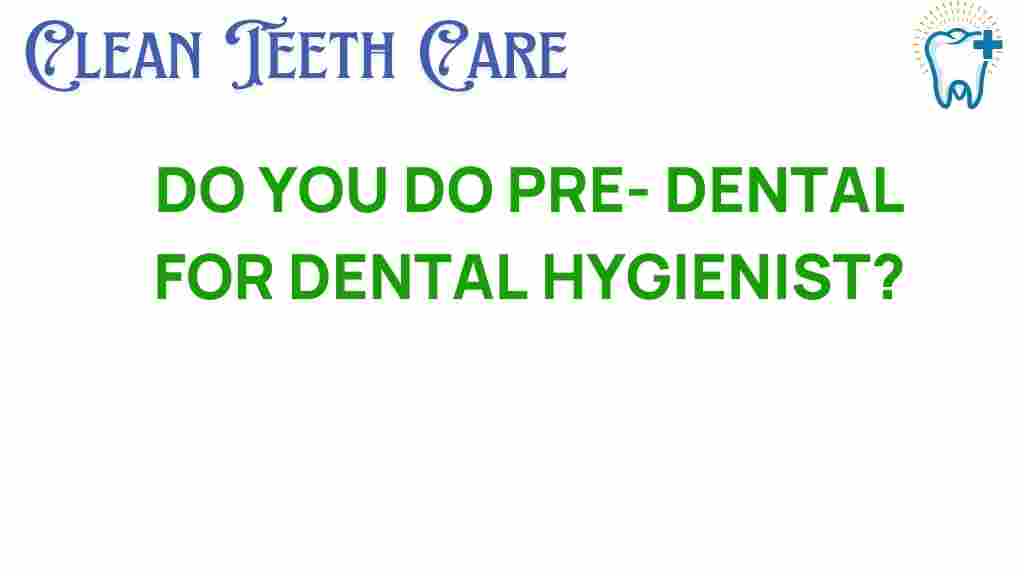Unveiling the Secrets of Pre-Dental Care for Aspiring Hygienists
Embarking on a journey to become a dental hygienist is both exciting and demanding. As an aspiring hygienist, understanding the nuances of pre-dental care is essential for building a successful career in the dental field. This article will guide you through the critical aspects of pre-dental care, focusing on oral health, education, dental training, professional development, and hygiene practices. By the end of this guide, you will have a clear roadmap to navigate the pre-dental landscape effectively.
Understanding Pre-Dental Care
Pre-dental care encompasses a variety of practices and knowledge areas that prepare you for a career as a dental hygienist. It includes:
- Oral Health: Maintaining optimal oral hygiene and understanding oral diseases.
- Education: Pursuing relevant academic qualifications and training programs.
- Dental Training: Gaining hands-on experience in clinical settings.
- Professional Development: Engaging in continuous learning and networking.
- Hygiene Practices: Implementing effective hygiene protocols to ensure patient safety.
The Importance of Oral Health
Oral health is a vital component of overall health. As a future dental hygienist, you will play a crucial role in promoting good oral hygiene practices among patients. Here are some key points to consider:
- Regular Check-ups: Encourage patients to schedule routine dental visits to prevent issues before they arise.
- Education on Hygiene Practices: Teach patients about proper brushing, flossing, and dietary choices that contribute to oral health.
- Understanding Oral Diseases: Familiarize yourself with common dental issues like cavities, gum disease, and oral cancer.
Essential Education for Aspiring Hygienists
To become a dental hygienist, you must complete specific educational requirements. Follow these steps to ensure you are on the right track:
- Complete a High School Diploma: Focus on subjects such as biology, chemistry, and health sciences.
- Pursue an Associate’s Degree: Enroll in an accredited dental hygiene program that offers both theoretical knowledge and practical training.
- Obtain a Bachelor’s Degree (Optional): For those looking to advance their careers, consider pursuing a bachelor’s degree in dental hygiene or a related field.
- Attend Continuing Education Courses: Stay updated with the latest practices and technologies in dental care.
Dental Training: Gaining Hands-On Experience
Hands-on experience is crucial in dental training. Here are ways to enhance your practical skills:
- Clinical Rotations: Participate in clinical rotations during your educational program to gain real-world experience.
- Volunteer Opportunities: Seek volunteer positions at community health clinics to serve diverse populations and practice your skills.
- Internships: Apply for internships at dental offices to observe and assist experienced hygienists.
Professional Development: Networking and Growth
Building a professional network is essential for career advancement. Consider the following tips:
- Join Professional Organizations: Become a member of organizations such as the American Dental Hygienists’ Association (ADHA) to access resources and networking opportunities.
- Attend Conferences and Workshops: Participate in events focused on dental hygiene to learn from industry leaders and connect with peers.
- Utilize Social Media: Engage with other professionals and stay informed about trends in dental hygiene through platforms like LinkedIn and Facebook.
Developing Hygiene Practices
As an aspiring dental hygienist, developing effective hygiene practices is paramount. Here’s how to establish a solid foundation:
- Master Infection Control: Learn about sterilization techniques and the use of personal protective equipment (PPE) to ensure a safe environment for both patients and staff.
- Implement Patient Education: Teach patients about the importance of oral hygiene and encourage them to adopt healthy habits.
- Stay Informed on Best Practices: Regularly read dental journals and publications to keep up with the latest research and hygiene protocols.
Troubleshooting Common Challenges in Pre-Dental Care
As you embark on your journey, you may encounter several challenges. Here are some common issues and tips on how to overcome them:
- Time Management: Balancing studies, clinical practice, and personal life can be overwhelming. Create a structured schedule to allocate time for each aspect of your life.
- Financial Constraints: Consider applying for scholarships or financial aid to help with tuition costs. Many dental schools offer resources to assist students.
- Staying Motivated: Set clear goals for your career and remind yourself of your passion for dental hygiene to stay focused during challenging times.
Conclusion: Your Path to Becoming a Dental Hygienist
In conclusion, pre-dental care is an integral part of your journey toward becoming a successful dental hygienist. By prioritizing oral health, pursuing the right education, gaining hands-on training, engaging in professional development, and implementing effective hygiene practices, you will be well-prepared for a rewarding career in dental hygiene. Remember, the road may be challenging, but with dedication and the right strategies, you can achieve your goals.
For more resources on dental hygiene education and training, check out the American Dental Hygienists’ Association website. Additionally, stay connected with fellow aspiring hygienists and professionals by visiting community forums and discussion groups online.
With the right approach and commitment to pre-dental care, your dream of becoming a dental hygienist is within reach. Start your journey today!
This article is in the category Treatments and created by CleanTeethCare Team
